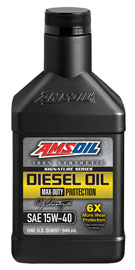Common Fixes for the Shuddering Transmission We get a lot saying our ATF solves the problem after trying about everything else! Here are a few common reasons why your transmission may shift erratically, jerk or hesitate. Low fluid level Depleted fluid frictional properties Poor cold-temperature fluidity Start with the easiest fix There’s an old […]
You are browsing archives for
Tag: signature series
GM dexos R Raised the Motor-Oil Bar for ...
GM dexos R Raises the Motor-Oil Bar for High-Performance Engines AMSOIL Signature Series outperformed before the GM motor oil specification. Try the 5W-50 Corvette oil available here in Sioux Falls. _by Brad Nelson |January 30, 2023 Reposting this past article on our Signature Dexos R 0W-40 and 5W-50. They’re huge sellers in our Omaha location […]
A closer Look At Engine Sludge
Preventing Causes of Engine Oil SLUDGE Brands matter, quality matters and frequent oil changes will not alter this. It’s all based on the additive quality and it does effect the price. Engine sludge occurs when oxidized oil and contaminants build up on engine surfaces. It can restrict the flow of oil to the point of […]
Want the Best Diesel Oils for Your Vehic...
Confused About Diesel Oil? We’ll help you Joel Youngman|Jan 31, 2020 8:03 AM Your diesel truck is a serious investment – don’t skimp on protection. AMSOIL manufactures the best diesel oils on the market, providing the ultimate protection for your hard-working diesel engine, preserving the horsepower you crave and keeping you on the road. We […]



